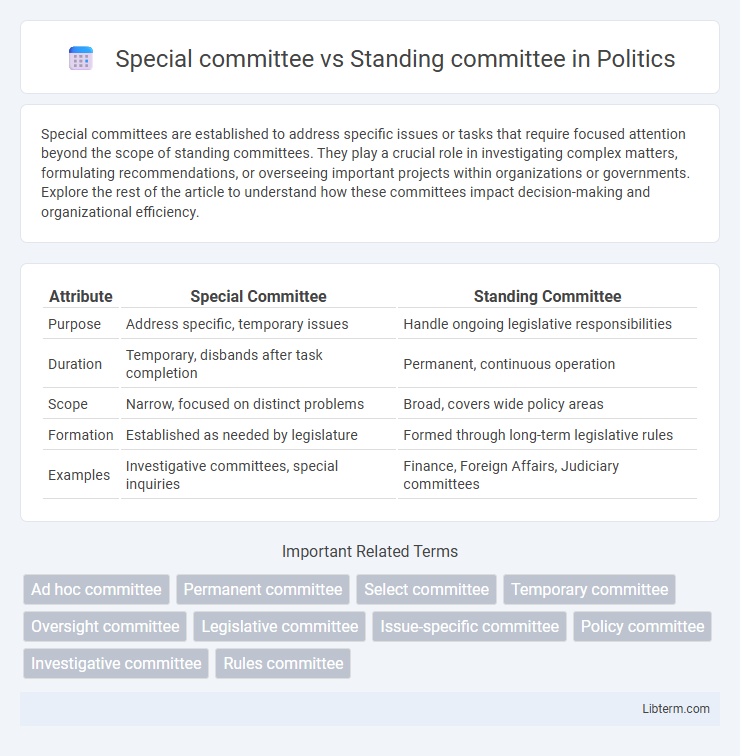Special committees are established to address specific issues or tasks that require focused attention beyond the scope of standing committees. They play a crucial role in investigating complex matters, formulating recommendations, or overseeing important projects within organizations or governments. Explore the rest of the article to understand how these committees impact decision-making and organizational efficiency.
Table of Comparison
| Attribute | Special Committee | Standing Committee |
|---|---|---|
| Purpose | Address specific, temporary issues | Handle ongoing legislative responsibilities |
| Duration | Temporary, disbands after task completion | Permanent, continuous operation |
| Scope | Narrow, focused on distinct problems | Broad, covers wide policy areas |
| Formation | Established as needed by legislature | Formed through long-term legislative rules |
| Examples | Investigative committees, special inquiries | Finance, Foreign Affairs, Judiciary committees |
Overview of Legislative Committees
Special committees are temporary legislative bodies established to address specific issues or investigations outside the scope of standing committees. Standing committees are permanent entities within the legislature, responsible for the continuous review and development of legislation in defined subject areas such as finance, agriculture, or education. Both types play crucial roles in the legislative process, with standing committees ensuring ongoing oversight and policy refinement, while special committees provide targeted expertise and resolution in specialized matters.
Definition of Standing Committees
Standing committees are permanent legislative panels established by the rules of a legislative body, tasked with continuous oversight, review, and development of policies related to specific subject areas such as finance, defense, or education. Unlike special committees, which are temporary and created to address particular issues or investigations, standing committees possess ongoing jurisdiction and authority to draft, amend, and report bills within their designated fields. This permanence ensures sustained legislative expertise and institutional memory essential for effective governance and lawmaking.
Definition of Special Committees
Special committees are temporary panels established to address specific issues or conduct detailed investigations outside the scope of standing committees. Unlike standing committees, which are permanent and handle ongoing legislative responsibilities, special committees disband once their assigned task is completed. These committees provide focused expertise and flexibility in responding to emerging legislative needs or unique challenges.
Formation and Membership
Special committees are formed temporarily to address specific issues or tasks and typically consist of members selected based on their expertise related to the committee's purpose. Standing committees are permanent bodies established by legislative rules with fixed membership that covers broad subject areas, ensuring continuous oversight and detailed consideration of legislation. Membership in standing committees is usually determined by party leadership and reflects proportional representation, whereas special committee membership is often appointed to fulfill the temporary mission efficiently.
Duration and Permanence
Special committees are temporary bodies established to address specific issues or investigations, disbanding once their objective is achieved, typically within a limited timeframe. Standing committees, in contrast, are permanent fixtures within a legislative body, functioning continuously to oversee routine governance areas like finance, defense, or health. The permanence of standing committees allows ongoing oversight and legislative development, while special committees provide focused, time-bound expertise on particular matters.
Powers and Functions
Standing committees possess continuous authority to review legislation, oversee government operations, and conduct investigations within their designated areas, enabling sustained influence on policy development. Special committees, established for specific purposes or investigations, have limited duration and focus on particular issues, with powers restricted to their assigned mandate. Unlike standing committees, special committees' functions are temporary and often advisory, lacking the broad legislative oversight inherent to standing committees.
Examples of Standing Committees
Standing committees such as the House Ways and Means Committee and the Senate Judiciary Committee play a crucial role in the legislative process by handling ongoing, specialized areas like taxation and judicial appointments. These permanent panels contrast with special committees, which are temporary and established to investigate specific issues or crises. The existence of standing committees ensures consistent oversight and expertise in key policy domains across congressional sessions.
Examples of Special Committees
Special committees are temporary panels established to address specific issues, commonly seen in investigations or legislative oversight, such as the U.S. House Select Committee on the January 6 Attack and the Senate Watergate Committee. Standing committees, in contrast, are permanent and handle ongoing areas like the House Ways and Means Committee or the Senate Judiciary Committee. Special committees often dissolve after their tasks conclude, while standing committees maintain continuous jurisdiction over legislative matters.
Advantages and Limitations
Special committees offer targeted expertise and flexibility to address specific issues quickly, enhancing problem-solving efficiency in legislative or organizational contexts. However, they may face limitations such as limited authority and temporary existence, which can hinder long-term impact. Standing committees provide consistent oversight and detailed knowledge on ongoing matters, but their broad scope might reduce responsiveness and adaptability to emerging challenges.
Key Differences Between Special and Standing Committees
Special committees are temporary panels established to address specific issues or investigations, disbanding once their objective is met, whereas standing committees are permanent bodies that handle ongoing legislative responsibilities within defined subject areas. Membership in special committees is often selected based on expertise or interest related to the temporary task, while standing committee members typically have continuing jurisdiction over policy areas such as finance, agriculture, or foreign affairs. The authority of standing committees includes reviewing legislation, oversight, and budget allocations, contrasting with the limited, focused mandate and lifespan of special committees.
Special committee Infographic

 libterm.com
libterm.com